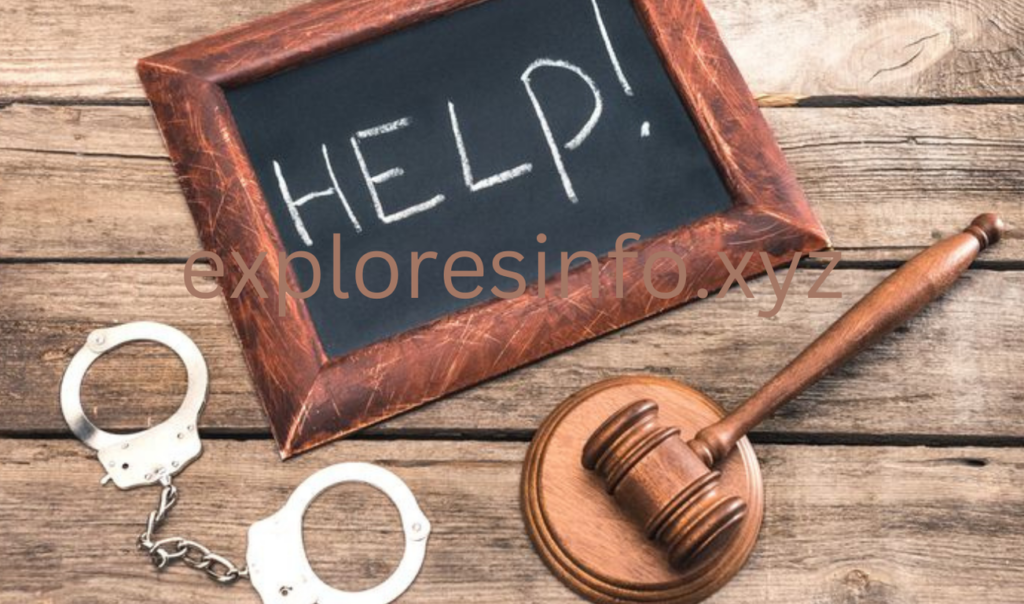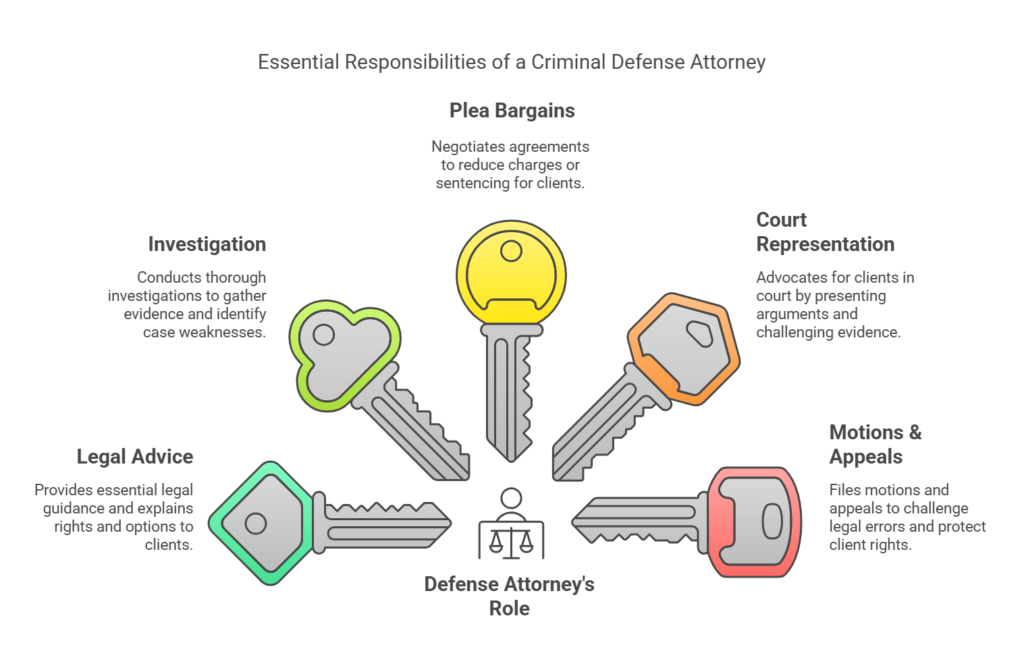Criminal defense is a fundamental aspect of the justice system, ensuring that individuals accused of crimes receive fair treatment under the law. Whether facing misdemeanor or felony charges, a strong defense can make the difference between conviction and acquittal, incarceration and freedom. This article explores the rights of the accused, key legal strategies used in criminal defense, and the critical role of a defense attorney in protecting a client’s interests.
Your Rights in a Criminal Case
Every individual accused of a crime is granted specific rights under the law. These rights are designed to ensure fairness and due process throughout the legal proceedings. Some most important rights include are:
1. The Right to Remain Silent
Under the Fifth Amendment of the U.S. Constitution, individuals have the right to avoid self-incrimination. This means that an accused person does not have to answer questions from law enforcement or prosecutors without legal representation.
2. The Right to Legal Representation
The Sixth Amendment guarantees that all accused individuals have the right to an attorney.
3. The Right to a Fair Trial
Every defendant is entitled to a fair and public trial by an impartial jury. This right ensures that legal proceedings are conducted fairly, without bias or prejudice.
4. The Right to Confront Witnesses
Defendants have the right to cross-examine witnesses testifying against them. This allows the defense to challenge the credibility and reliability of prosecution witnesses.
5. The Right to be informed of Charges
Individuals accused of a crime must be informed of the nature and cause of the accusations against them, ensuring they understand the charges they face.
6. Protection against Double Jeopardy
The Fifth Amendment also protects individuals from being tried twice for the same offense once they have been acquitted or convicted.
Legal Strategies in Criminal Defense
Defense attorneys employ a variety of legal strategies to protect their clients and achieve favorable outcomes. The strategy chosen depends on the nature of the charges, available evidence, and specific circumstances of the case.
1. Innocence and Alibi Defense
A defendant may argue that they were not present at the crime scene or have an alibi proving their innocence. Evidence such as surveillance footage, witness testimony, or digital records can support this defense.
2. Self-Defense or Justification
In cases involving violent crimes, a defendant may claim self-defense. This argument asserts that the accused acted to protect themselves or others from imminent harm.
3. Lack of Intent or Mistake of Fact
Some crimes require proof of intent. If the defense can show that the accused did not have criminal intent or made an honest mistake, this could lead to reduced charges or an acquittal.
4. Insanity Defense
A defendant may claim that they were legally insane at the time of the crime and could not distinguish right from wrong. This defense often requires expert testimony from psychiatrists or psychologists.
5. Entrapment
If law enforcement officers induced the accused to commit a crime they would not have otherwise committed, an entrapment defense may be used to dismiss charges.
6. Challenging the Prosecution’s Evidence
A common strategy involves questioning the validity of the prosecution’s evidence. This may include arguing that evidence was obtained illegally, forensic errors occurred, or that witness testimony is unreliable.

The Role of a Criminal Defense Attorney
A defense attorney plays a crucial role in the legal process, ensuring their client’s rights are protected and building a strong defense. The responsibilities of a criminal defense lawyer include:
1. Legal Advice and Guidance
A defense attorney provides clients with essential legal advice, explaining their rights, possible outcomes, and legal options. This guidance helps defendants make informed decisions.
2. Investigation and Evidence Gathering
An experienced lawyer conducts thorough investigations, collecting evidence, interviewing witnesses, and reviewing police reports to identify weaknesses in the prosecution’s case.
3. Negotiating Plea Bargains
In some cases, a defense attorney may negotiate a plea bargain with the prosecution. This agreement may result in reduced charges or lighter sentencing in exchange for a guilty plea.
4. Court Representation and Advocacy
During trial, a defense lawyer presents arguments, cross-examines witnesses, and challenges the prosecution’s case to secure the best possible outcome for their client.
5. Filing Motions and Appeals
If necessary, an attorney can file motions to suppress evidence, request case dismissals, or appeal a conviction if legal errors occurred during the trial.

Conclusion
Understanding criminal defense is essential for anyone facing legal charges or seeking knowledge about the justice system. Every individual has fundamental rights, including the right to remain silent, the right to legal representation, and the right to a fair trial. A strong defense strategy depends on various factors, such as the nature of the charges, available evidence, and legal precedents.
A skilled defense attorney plays a crucial role in protecting the accused by analyzing the case, negotiating plea deals, and presenting a strong argument in court. Their expertise can make a significant difference in the outcome of a case, whether by reducing penalties, securing acquittals, or ensuring fair treatment under the law.
Ultimately, criminal defense is about upholding justice and ensuring that every individual receives a fair chance to defend themselves. By understanding your rights and seeking qualified legal assistance, you can navigate the complexities of the legal system with confidence and clarity.
FEQs
1. What is criminal defense?
Criminal defense refers to the legal representation and advocacy provided to individuals accused of committing a crime. A defense attorney works to protect the accuser’s rights, challenge the prosecution’s case, and seek the best possible outcome, whether through dismissal, acquittal, or reduced charges.
2. What are my rights if I’m accused of a crime?
If you’re accused of a crime, you have several fundamental rights, including:
- The right to remain silent (Fifth Amendment).
- The right to an attorney (Sixth Amendment).
- The right to a fair trial by an impartial jury.
- The right to due process under the law.
3. What does a criminal defense attorney do?
A criminal defense attorney:
- Provides legal advice and explains your rights.
- Investigates the case, gather evidence, and interview witnesses.
- Develops legal strategies to challenge the prosecution’s case.
- Represents you in court, during plea negotiations, and at trial.
- Works to reduce charges, secure a plea deal, or achieve an acquittal.
4. When should I hire a criminal defense attorney?
You should hire a criminal defense attorney as soon as you are accused of a crime or become aware of an investigation. Early involvement allows your attorney to protect your rights, gather evidence, and build a strong defense.
5. What are common legal strategies in criminal defense?
Common strategies include:
- Challenging the legality of evidence (e.g., improper search and seizure).
- Questioning the credibility of witnesses or evidence.
- Presenting alibis or alternative explanations.
- Negotiating plea bargains for reduced charges or sentences.
- Arguing for dismissal of charges due to lack of evidence or procedural errors.
6. What is a private defense attorney?
- Private defense attorneys are hired directly by the defendant and may offer more personalized attention and resources, depending on their expertise and fees.
7. Can I represent myself in a criminal case?
While you have the right to represent yourself (pro se), it is highly discouraged. Criminal law is complex, and without legal expertise, you may risk severe consequences, including harsher penalties or wrongful convictions.
8. What should I look for when hiring a criminal defense attorney?
Look for:
- Experience in handling cases similar to yours.
- A strong track record of success.
- Good communication skills and responsiveness.
- Transparent fee structures.
- Positive reviews or recommendations.
9. What happens if I can’t afford a defense attorney?
If you cannot afford an attorney, you can request a public defender. The court will assess your financial situation and appoint one if you qualify.
10. What is a plea bargain, and is it a good option?
A plea bargain is an agreement between the defense and prosecution where the defendant pleads guilty to a lesser charge or receives a reduced sentence in exchange for avoiding a trial. It can be a good option if the evidence against you is strong and the deal is favorable, but your attorney can help you decide.
11. How long does a criminal defense case take?
The duration varies depending on the complexity of the case, the court’s schedule, and whether the case goes to trial. Some cases are resolved quickly through plea deals, while others may take months or even years.
12. Can charges be dropped before trial?
Yes, charges can be dropped if:
- The evidence is insufficient.
- Your rights were violated during the investigation or arrest.
- The prosecution decides not to pursue the case.
13. What is the role of evidence in a criminal defense case?
Evidence is critical in building a defense. Your attorney will analyze the prosecution’s evidence for weaknesses and gather exculpatory evidence (evidence that supports your innocence or reduces culpability).
14. What happens if I’m found guilty?
If you’re found guilty, the judge will impose a sentence, which may include fines, probation, community service, or incarceration. Your attorney can advocate for a lighter sentence or explore options for appeal.
If you have more specific questions about criminal defense, consult a qualified defense attorney for personalized advice.
